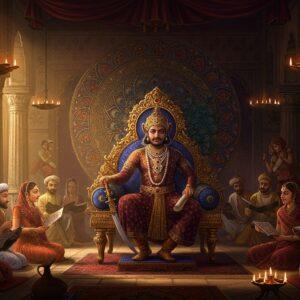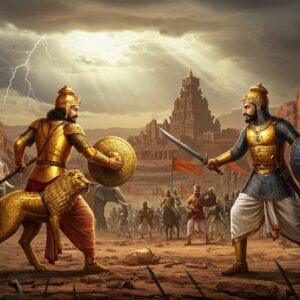
Allama Prabhu, a revered 12th-century Lingayat saint and Vachana poet, holds a significant place in Kannada literature and spirituality. His profound contributions to the Vachana movement, a socio-religious reformation in 12th-century Karnataka, continue to inspire. Central to his poetic expression is the use of “Ankitanama,” a pen name carrying deep spiritual meaning.
Allama Prabhu and the Vachana Revolution
The Vachana movement, spearheaded by figures like Allama Prabhu, Basavanna, and Akka Mahadevi, challenged traditional societal norms and religious rituals. It emphasized a direct, personal experience of the divine, accessible to all regardless of caste or creed. Allama Prabhu’s Vachanas, written in simple yet powerful Kannada, became instrumental in spreading this message of social equality and spiritual liberation. These poems resonated with the common people, sparking a new wave of spiritual thinking.
You can enhance your spiritual journey with authentic prayer beads and other ritual items available on Poojn.in. Explore our collection of Japa Malas and other sacred items to deepen your practice.
The Significance of Ankitanama
The tradition of Ankitanama, meaning “pen name,” goes beyond mere identification. It represents the poet’s spiritual identity and journey. For Allama Prabhu, his Ankitanama, “Guheshwara,” meaning “Lord of the Caves,” holds profound symbolism. It reflects his pursuit of enlightenment and self-realization, often associated with the imagery of seeking solace and wisdom within the depths of a cave.
Unveiling the Meaning of Guheshwara
Guheshwara, Allama Prabhu’s Ankitanama, offers a glimpse into his spiritual experiences. The name suggests a connection to the divine within the confines of a cave, symbolizing introspection and the search for inner truth. It’s believed that Allama Prabhu attained enlightenment in a cave temple, making “Guheshwara” a celebration of this transformative experience. This resonates with the broader themes of self-discovery and spiritual awakening found in his Vachanas.
Exploring the Themes of Allama Prabhu’s Poetry
Allama Prabhu’s Vachanas are rich with metaphors drawn from nature, the human body, and the divine. These symbolic representations convey his spiritual insights and explore the complexities of existence. He often uses the imagery of light and darkness, representing knowledge and ignorance, to guide his readers towards spiritual awakening.
-
Quest for Truth: Allama Prabhu’s poems often delve into the search for ultimate truth and the nature of reality. He encourages introspection and self-inquiry as paths to understanding one’s true self.
This resonates with many spiritual seekers who grapple with existential questions and seek meaning in life. Allama Prabhu’s poems provide guidance and inspiration on this journey of self-discovery.
-
Transcending Material Desires: His Vachanas emphasize the importance of detaching from material possessions and worldly desires. He advocates for a simple life focused on spiritual growth and inner peace.
This message is particularly relevant in today’s materialistic world. Allama Prabhu reminds us to seek fulfillment beyond material wealth and to focus on cultivating inner contentment.
Allama Prabhu’s Enduring Legacy
Allama Prabhu’s influence on Kannada literature and spiritual thought remains profound. His teachings continue to resonate with people from all walks of life, inspiring poets, scholars, and spiritual seekers. His Vachanas are studied and recited, carrying his message of social equality and spiritual liberation across generations.
His legacy is a testament to the power of his words and the depth of his spiritual insight.
Poojn.in offers a wide variety of Chandan Tilak, perfect for your spiritual practices. Discover our selection of Chandan Tilak and enhance your daily rituals.
Embracing Allama Prabhu’s Wisdom Today
Allama Prabhu’s teachings offer valuable guidance for navigating the complexities of modern life. His emphasis on inner peace, social equality, and the pursuit of truth provides a framework for living a meaningful life. As we delve into his Vachanas and reflect on his Ankitanama, “Guheshwara,” we are invited to embark on our own journey of self-discovery and spiritual awakening. Explore other spiritual readings on Poojn.in.
Frequently Asked Questions
What does “Ankitanama” mean? Ankitanama is a Kannada term that translates to “pen name.” In the context of Vachana literature, it signifies a poet’s spiritual identity.
Why is Allama Prabhu’s Ankitanama significant? Allama Prabhu’s Ankitanama, “Guheshwara,” or “Lord of the Caves,” symbolizes his spiritual journey and the attainment of enlightenment, believed to have occurred within a cave.
What are the central themes in Allama Prabhu’s Vachanas? His poems explore themes of self-realization, the pursuit of truth, detachment from material desires, and the importance of social equality.
Discover more about Indian spirituality and traditions by exploring our blog. Learn about the sacred power of water in rituals and the vibrant festivals of Odisha.


